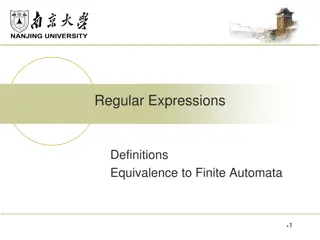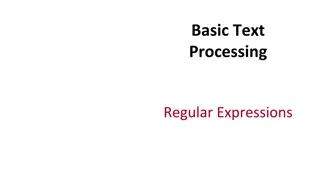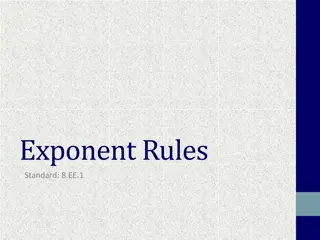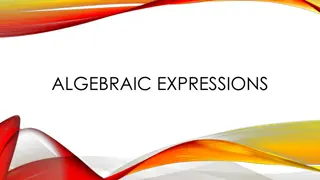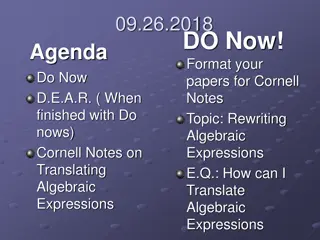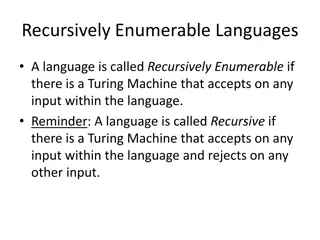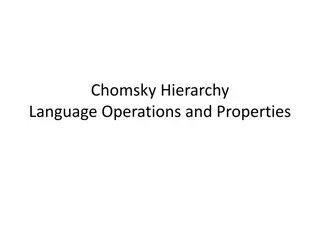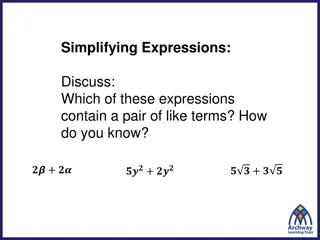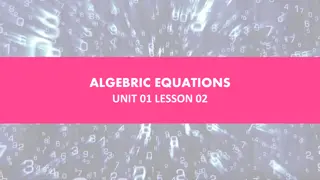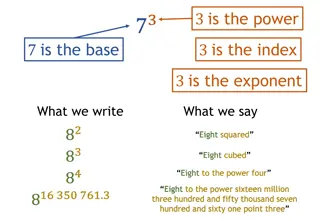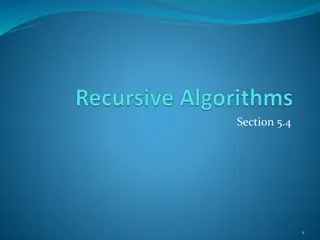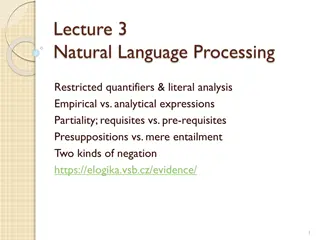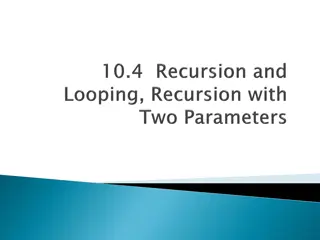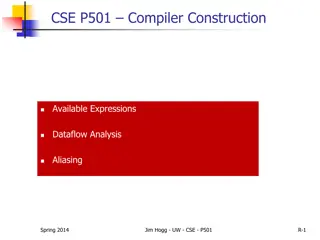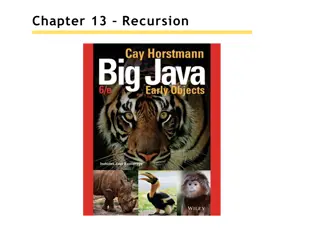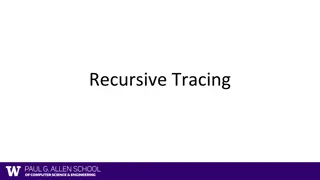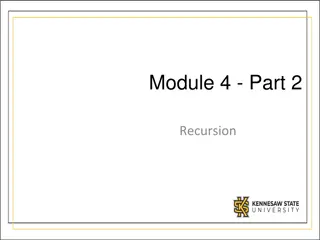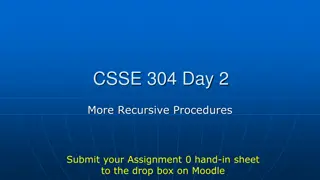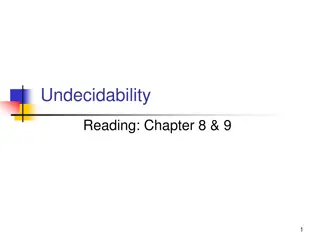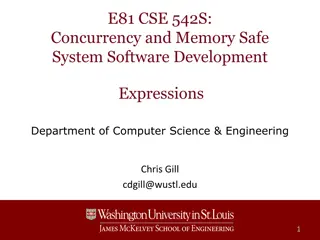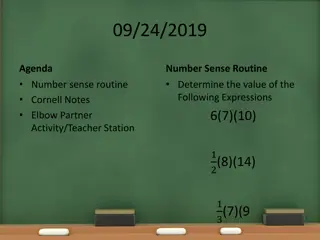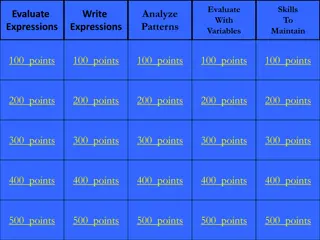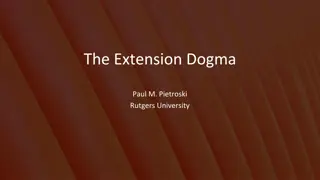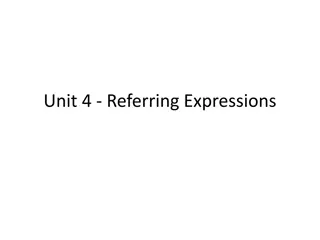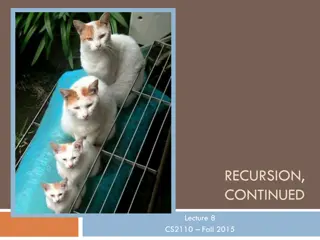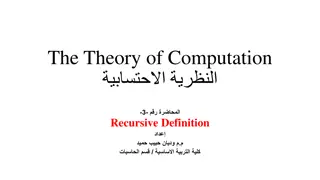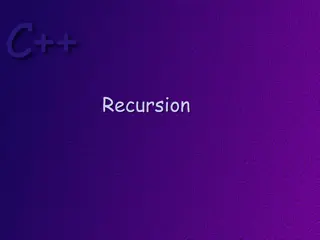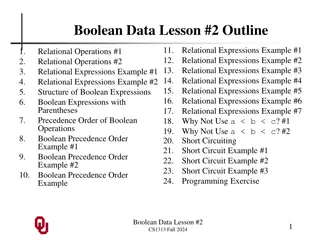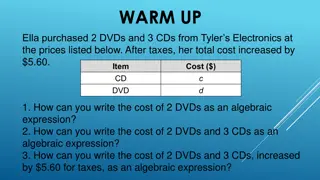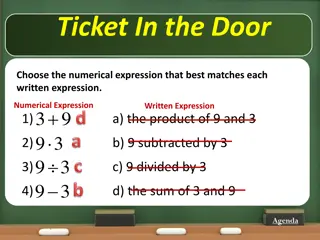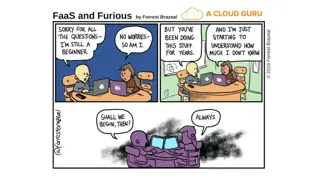Introduction to Regular Expressions and Equivalence to Finite Automata
Regular expressions (REs) are used to describe languages by algebra and are equivalent to finite automata. They define regular languages precisely using operations like union, concatenation, and Kleene star. The concatenation of languages combines strings from two languages, while the Kleene star re
9 views • 106 slides
Adverbs and Expressions of Frequency in English
Reviewing adverbs and expressions of frequency in English language for oral and written text production. Focus on types of relationships and grammar. Activities to analyze sentences and frequency indicators. Overview of common adverbs and expressions used to express regularity.
5 views • 20 slides
Regular Expressions for Text Processing
Regular expressions provide a powerful way to search for and manipulate text strings by specifying patterns. This content explores different aspects of regular expressions, including disjunctions, negations, more disjunctions, optional characters, anchors, and examples. By learning how to use regula
2 views • 46 slides
Exponents and Rules
Exponents are a shortcut for repeated multiplication. Learn how to write expressions using exponents, evaluate expressions containing exponents, and apply rules for dealing with exponents. Explore examples and see how to write expressions in exponential form, evaluate them using calculators, and sim
2 views • 32 slides
Algebraic Expressions: Variables, Coefficients, and Constants
Explore the difference between numeric and algebraic expressions, learn about the components of algebraic expressions - variables, coefficients, and constants. Discover how to identify variables, coefficients, and constants in expressions. Classify algebraic expressions as monomials, binomials, or t
0 views • 20 slides
Mastering Algebraic Expressions: Translating Words to Equations
Learn how to translate word phrases into algebraic expressions for addition, subtraction, multiplication, and division. Understand the key phrases associated with each operation to write expressions accurately. Enhance your skills in rewriting algebraic expressions with practical examples and concis
4 views • 17 slides
Recursive vs Recursively Enumerable Languages
Comparison between recursive and recursively enumerable languages in terms of Turing Machines acceptance, decidable languages, recognizable languages, and partial predicates. Explains the concepts with examples and how Turing Machines decide membership in languages.
0 views • 8 slides
Chomsky Hierarchy in Language Theory
Explore Chomsky Hierarchy in language theory, including different types of languages, grammars, and automata. Learn how to prove if a language is regular, context-free, recursive, or recursively enumerable. Understand the closure properties of regular, context-free, recursive, and recursively enumer
3 views • 10 slides
Introduction to Perl Regular Expressions in SAS
Regular expressions are powerful tools for working with unstructured data in SAS, allowing you to search for specific patterns, extract substrings, and perform text substitutions using metacharacters in Perl. While writing regular expressions can be challenging at first, with practice, you can becom
1 views • 33 slides
Simplifying Expressions by Identifying Like Terms
This content discusses the concept of like terms in algebraic expressions and explains how to identify and simplify expressions by collecting like terms. It provides visual examples and prompts for practice to enhance understanding.
0 views • 27 slides
Algebraic Expressions and Exponents
Master the basics of algebraic expressions, simplification, and exponent rules in this lesson. Learn to interpret word problems into algebraic expressions, apply properties of real numbers, and solve algebraic problems step by step. Practice evaluating expressions, simplifying equations, and underst
1 views • 13 slides
Numerical Expressions and Exponents Overview
This content covers various numerical expressions involving exponents, including examples of valid and invalid mathematical representations, matching worded expressions with their numerical equivalents, and identifying the correct expressions based on provided criteria.
0 views • 30 slides
Tower of Hanoi Puzzle and its Recursive Solution
Tower of Hanoi is a classic game involving moving disks between three pegs, following specific rules. This article provides an introduction to the game, notations used, recursive approaches to solve it, and a detailed walkthrough for N=2 and N=3 scenarios. Explore the recursive steps, time complexit
0 views • 12 slides
Merge Sort Algorithm in Computer Science
Explore the concept of the merge sort algorithm as a practical example of tree recursion. Learn how merging works, the steps involved in the merge algorithm, and how recursive merge sort can efficiently sort unsorted lists. Dive into the recursive implementation of merge sort and grasp its recursive
0 views • 22 slides
Mathematical Analysis of Algorithms in CMPE371 - Fall 2023-2024
Explore the mathematical analysis of algorithms in CMPE371 for Fall 2023-2024, focusing on non-recursive and recursive algorithms. Learn how to analyze non-recursive algorithms by deciding on input size parameters, identifying basic operations, and simplifying summations. Dive into recursive algorit
1 views • 31 slides
Recursive Algorithms in Computing
Explore recursive algorithms in computing, including the definition, examples like factorial, exponentiation, GCD, and modular exponentiation. Dive into the concept of solving problems by breaking them into smaller instances, ensuring termination with known solutions.
0 views • 16 slides
Empirical vs Analytical Expressions in Natural Language Processing
Restricted quantifiers and literal analysis in natural language processing reveal the distinctions between empirical and analytical expressions. While empirical expressions refer to non-trivial intensions that require empirical investigation, analytical expressions denote constant intensions that ca
1 views • 19 slides
Recursive Functions in Programming
Recursive functions in programming are powerful tools that can be used to solve complex problems by breaking them down into smaller, more manageable sub-problems. This content explores how recursive methods can be implemented using examples like the pool rack and division functions, showcasing the c
0 views • 15 slides
The Magic of Recursion in Programming
Discover the power of recursion in programming through insightful insights and examples. Explore recursive algorithms, methods, and the significance of believing in yourself as a programmer. Understand the crucial roles of arguments and parameters in methods, and delve into the intricacies of how me
0 views • 77 slides
Dataflow Analysis for Available Expressions in Compiler Construction
Utilizing dataflow analysis techniques, the concept of available expressions is discussed in the context of compiler construction. The goal is to identify common subexpressions that span basic blocks by calculating their availability at the beginning of each block. The process involves determining w
0 views • 59 slides
Recursion in Computer Science
Exploring the concept of recursion in computer science, this chapter delves into its applications, advantages, and efficiency. From understanding recursive helper methods to analyzing problems suited for recursive solutions, this chapter covers the fundamental principles of recursion using examples
0 views • 86 slides
Recursive and Iterative Factorials through Tracing
This content provides an in-depth exploration of recursive and iterative factorial functions through tracing examples. The explanations are accompanied by visual aids to help conceptualize the iterative and recursive processes of calculating factorials. By comparing the two methods side by side, rea
0 views • 7 slides
Recursion in Programming
Recursion in programming involves a method calling itself to solve problems by breaking them down into simpler subproblems. The process requires a base condition, recursive calls, and progress towards termination. This technique is illustrated through examples like calculating factorials using recur
0 views • 64 slides
CSSE 304 Day 2 - Recursive Procedures and Assignment Submission
Explore the concepts of recursion in CSSE 304 Day 2, including writing recursive procedures, finding starting code, running tests, and solving tasks like finding medians and counting occurrences. Join breakout rooms for more practice and don't forget to submit your assignment on Moodle.
0 views • 8 slides
Recursive and Recursively Enumerable Languages
Exploring the concepts of decidability and undecidability in computer science, specifically focusing on Recursive and Recursively Enumerable (RE) languages. Recursive languages always halt, while RE languages may or may not halt, showcasing the differences between decidable and undecidable problems.
0 views • 35 slides
Rust Expressions and Declarations in System Software Development
Rust is an expression language where most things have values. Learn about Rust expressions, blocks, declarations, conditional expressions, multi-case expressions, and iteration expressions in system software development. Explore the execution semantics, syntax, and best practices for writing safe an
0 views • 8 slides
Top-Down Parsing in Context-Free Syntax
Context-free syntax expressed with context-free grammar plays a key role in top-down parsing. This parsing method involves constructing parse trees from the root down to match an input string by selecting the right productions guided by the input. Recursive-descent parsing, Rule Sentential Forms, an
0 views • 17 slides
Algebraic Expressions Lesson Overview
This lesson focuses on writing and reading algebraic and written expressions with grouping symbols and less than. Students will learn how to translate expressions containing groupings and less than. The lesson is designed to build on the previous day's lesson and challenge students' thinking. It set
0 views • 25 slides
Expressions and Patterns Evaluation Practice
The content focuses on evaluating expressions with variables, analyzing patterns, and maintaining mathematical skills. It includes practice exercises such as inserting parentheses to alter expression values and identifying errors in calculations. Additionally, it presents scenarios where individuals
0 views • 53 slides
Divide and Conquer Algorithms in Computer Science
In the recent lecture, we revisited topics such as the exam review, data compression, and mergesort. We also delved into a captivating puzzle set on the planet Og, exploring the logic behind truth-telling and lying natives. Furthermore, we discussed the transformation of recursive functions into non
2 views • 36 slides
The Extension Dogma: Exploring Meaning and Extensions in Linguistic Expressions
The Extension Dogma challenges the assumption that linguistic expressions inherently possess meanings. Instead, it posits that expressions have extensions without necessary meanings that determine them. Theories of meaning should focus on the extensions of expressions, while psychological studies of
0 views • 30 slides
Referring Expressions in Linguistics
Explore the concept of referring expressions in linguistics with examples, quick quizzes, and explanations. Learn about expressions with variable and constant references, differences in referents, expressions with no reference, and the definition of reference. Discover how linguistic context plays a
0 views • 10 slides
Recursive Methods: A Comprehensive Guide
This content delves into the concept of recursion, particularly focusing on understanding recursive methods and how they are executed. It provides steps to approach recursive methods effectively, emphasizing the importance of having a precise specification and verifying correctness in base and recur
0 views • 14 slides
Introduction to Recursive Definitions in The Theory of Computation
Explore recursive definitions in the realm of computation theory through examples like defining sets of even numbers, factorial language, palindrome strings, and more. Learn how to prove properties using recursive rules and construct languages with specific patterns and constraints.
0 views • 10 slides
Recursion in Programming
Explanation of recursion in programming, including objectives, examples, and step-by-step breakdown. Learn how to design functions using recursion to solve problems effectively. Dive into the concept of recursive functions with a practical example of writing digits of an integer vertically. Explore
0 views • 53 slides
Relational Operations for Boolean Expressions
Learn about relational operations in Boolean expressions through examples and explanations. Discover how to compare numeric operands to produce Boolean results, covering equal to, not equal to, less than, less than or equal to, greater than, and greater than or equal to operations. The content inclu
0 views • 25 slides
Algebraic Expressions: Terms, Factors, and Coefficients
When dealing with algebraic expressions, it's essential to grasp terms, factors, and coefficients. Expressions consist of numbers, operations, and variables, with terms being the building blocks separated by addition or subtraction signs. Factors are the components of each term that produce the give
0 views • 13 slides
One-to-One and Recursive Relationships in Data Modeling
Explore the concepts of one-to-one and recursive relationships in data modeling through images and explanations. Learn about labeling relationships, mapping foreign keys, and creating tables in MySQL Workbench. Dive into examples showcasing 1:1 relationships and recursive relationships, with insight
0 views • 43 slides
Math Expressions Exploration for Elementary Students
This content discusses numerical and algebraic expressions, teaching students how to match written expressions to numerical expressions, understand the concept of variables, and differentiate between algebraic and numerical expressions. It also covers basic operations like addition, subtraction, mul
0 views • 11 slides
Basic Python Syntax and Expressions
Python programs manipulate values using expressions and statements. Programs work by evaluating expressions that result in values. The interpreter processes expressions to display their values, while statements direct the flow of the program. Python supports different data types such as integers, fl
0 views • 46 slides
